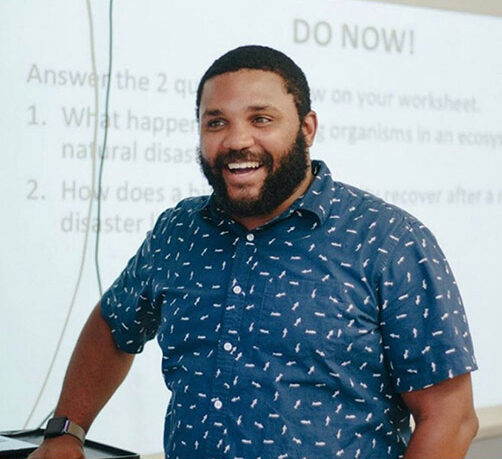
Africana studies major forms network through Wooster community

When he graduated from Garfield High School in Akron, Dierre Taylor ’09, the first in his family who would attend college, had every intention of accepting the full-ride scholarship offered to him by Akron University or Ohio State University, until he and his parents visited The College of Wooster. “My parents could really see all it had to offer as a smaller institution,” he said, and they told him they thought attending OSU as planned would be a mistake, even if it meant paying more for his education.
After talking with Wooster Admissions, Taylor interviewed for the Allen Scholarship. Named for Clarence Beecher Allen, the first African American graduate of Wooster, the scholarship supports African American students. Excited to also join the football team and run track at Wooster, Taylor made the switch and didn’t regret it. In his first days on campus, he connected with Emmanuel Paul Sterling ’07 and Tristan Jordan ’08. As fellow African American students, they wanted to offer him their support. “They took an invested interest in me and making sure I felt safe, heard, and loved. I knew that I could always go to them or others in the community,” said Taylor. “That Wooster connection never ceases to amaze me. It made me feel equipped to be a success story.”
When Taylor became an Africana studies major, Josephine Wright, Josephine Lincoln Morris Professor of Africana Studies became another advocate for him. “I wouldn’t be the person I am today if it wasn’t for Dr. Wright and her very honest, loving approach,” he said, remembering the “swift kick” she gave him toward completing the writing for his Independent Study. The experience continues to motivate him today in his work as a graduate student, teacher, and education advocate. “I go back to that experience constantly in terms of how I approach the research that I did for grad school but also my work in general,” he said. He’s completed a master’s studying middle school science education at Brooklyn College and a master’s in educational leadership from The College of St. Rose in Albany, New York.
In his role as a peer independent evaluator with the New York City Department of Education, Taylor uses his experience with research to “stay informed and knowledgeable of new things that are coming up in educational policy.” Taylor works with teachers both as a coach and an evaluator. Throughout the year, he visits teachers in New York City schools where he says the student population is 70% Black students. He acts as an advocate for these students in the same way that Wright and Sterling supported him. “I really like to think of myself as standing on the side of the students always,” he said. “I want them to have educators who are going to stand on their side as well.”
As a consultant with Teach for America and STEM Ed Innovators, Taylor coaches teachers to understand how they can “flatten the authority structure in the classroom.” After putting his experience in biology to work as a science teacher for 10 years, Taylor says, “I know what it means to elicit student knowledge and leverage their leadership as a way of building community as an authority structure in the classroom. I’m learning from them, and they’re learning from me. I help them to transition to a relationship that’s shared and a transformation of authority between the teacher and the student.”
While he’s not able to go into classrooms since the onset of the coronavirus pandemic this March, Taylor said, “The pandemic really illuminated some of the disparities and systems of oppression that exist in NYC Education. The system hasn’t been working for our most marginalized Black and Brown students for a long time, and it feels like it’s time for us to deconstruct some of these systems that have never really worked.” His office is working toward meeting the needs of these marginalized students, helping teachers to recognize the level of influence they have, and how they can positively impact their students by disrupting oppression in their classrooms. “It’s about understanding how we are living our lives in a way that is more aware of the things that we are privileged to have and do and how are we actively disrupting those systems,” he said, acknowledging that this work is ongoing. “It’s really how do you move beyond that and look at humanity differently so that you can show up better.”
As he continues to advocate for the students in his community and engage with educators to understand their biases, his gratitude for his experiences at Wooster inspires him to give to the College on a monthly basis. “All of my experiences informed who I am today and the work that I do. I would not be the person I am today if I had gone to OSU or Akron,” he said. “Wooster has given me a lot of invaluable skills and a network of people that I can call my best friends but also a network of professionals that I can call on for advice if I need it.”
Posted in Alumni on July 17, 2020.
Related Posts
Related Areas of Study
Africana Studies
An interdisciplinary approach to interpreting the lives and experiences of the world's Black women and men.
Major Minor

